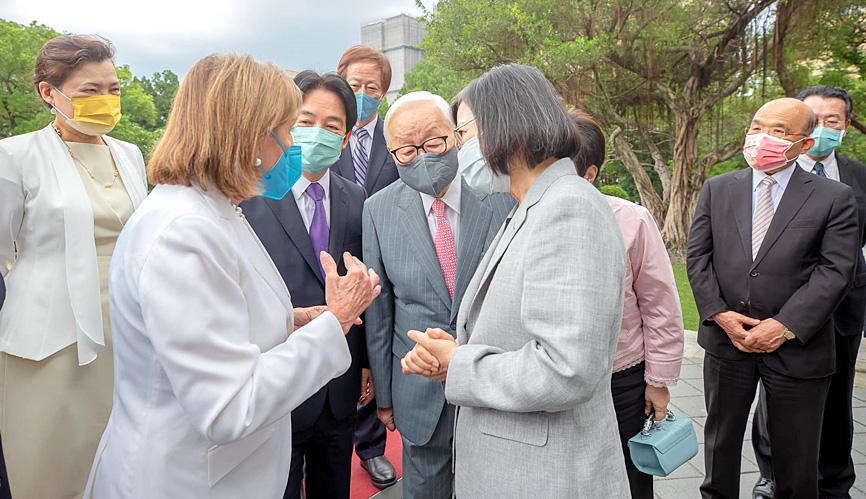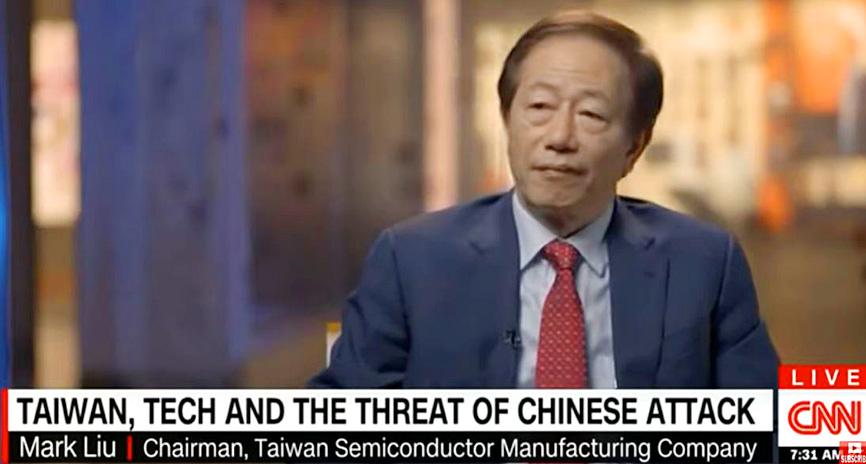A delegation led by US House of Representatives Speaker Nancy Pelosi yesterday met with Taiwan Semiconductor Manufacturing Co (TSMC) chairman Mark Liu (劉德音) to discuss the passage of the draft “creating helpful incentives to produce semiconductors (CHIPS) and science act” in the US Congress, Democratic Progressive Party (DPP) caucus whip Ker Chien-ming (柯建銘) said.
Ker made the remarks after Pelosi’s congressional delegation wrapped up a one-hour meeting with Deputy Legislative Speaker Tsai Chi-chang (蔡其昌) and the legislative caucus whips of four political parties to exchange views about key issues. Ker did not disclose what issues were discussed.
“One US lawmaker specifically talked about his efforts to push through the CHIPS act, which he believes will exert deep influence on the semiconductor industry and the whole supply chain,” Ker told reporters. “To my understanding, Pelosi and her delegation met TSMC chairman Mark Liu this morning. They talked about the chip issue and the meaning behind the passage of the CHIPS act.”

Photo from President Tsai Ing-wen’s Facebook page
TSMC, however, said there was no private meetings between Liu and Pelosi.
TSMC, the nation’s most valuable company and the world’s largest contract chipmaker, said it has no comments on the meeting between Pelosi and Liu, nor on the CHIPS act and its US$52 billion in subsidies.
The act is considered an important legislative base for chipmakers to receive US government subsidies and tax incentives for building new chip capacity in the country, where chip manufacturing costs are much higher than in Taiwan.

Photo: Still frame grab from CNN.com
The subsidies would help narrow the manufacturing cost gap, TSMC said earlier.
The act stipulates that companies that receive funding cannot use it to boost production of advanced chips in China.
Last month, Liu told investors that the cost of its new fab in Arizona, which is under construction, was higher than expected and it is increasing.
“We are still working on the government subsidy and we’ll continue working on the cost reduction,” he said.
Production costs at TSMC’s Oregon factory are 50 percent higher than at its factories in Taiwan, company founder Morris Chang (張忠謀) said in April.
TSMC is building a US$12 billion fab in Arizona aiming to produce 5-nanometer chips from 2024.

Chinese spouse and influencer Guan Guan’s (關關) residency permit has been revoked for repeatedly posting pro-China videos that threaten national security, the National Immigration Agency confirmed today. Guan Guan has said many controversial statements in her videos posted to Douyin (抖音), including “the red flag will soon be painted all over Taiwan” and “Taiwan is an inseparable part of China,” and expressing hope for expedited reunification. The agency last year received multiple reports alleging that Guan Guan had advocated for armed reunification. After verifying the reports, the agency last month issued a notice requiring her to appear and explain her actions. Guan

The Kaohsiung Tourism Bureau audited six hotels in an effort to prevent price gouging ahead of Korean band BTS’ concert tour in the city scheduled for Nov. 19, 21 and 22 this year. The bureau on Friday said that the audits — conducted in response to allegations of unfair pricing posted on social media — found no wrongdoing. These establishments included the local branches of Chateau de Chine, Hotel Nikko, My Humble House, and Grand Hai Lai, it said, adding that the Consumer Protection Commission would have penalized price gougers had the accusations been substantiated. The bureau said the Tourism Development Act

BACK TO WINTER: A strong continental cold air mass would move south on Tuesday next week, bringing colder temperatures to northern and central Taiwan A tropical depression east of the Philippines could soon be upgraded to be the first tropical storm of this year, the Central Weather Administration (CWA) said yesterday, adding that the next cold air mass is forecast to arrive on Monday next week. CWA forecaster Cheng Jie-ren (鄭傑仁) said the first tropical depression of this year is over waters east of the Philippines, about 1,867km southeast of Oluanpi (鵝鑾鼻), and could strengthen into Tropical Storm Nokaen by early today. The system is moving slowly from northwest to north, and is expected to remain east of the Philippines with little chance of affecting Taiwan,

GIVE AND TAKE: Blood demand continues to rise each year, while fewer young donors are available due to the nation’s falling birthrate, a doctor said Blood donors can redeem points earned from donations to obtain limited edition Formosan black bear travel mugs, the Kaohsiung Blood Center said yesterday, as it announced a goal of stocking 20,000 units of blood prior to the Lunar New Year. The last month of the lunar year is National Blood Donation Month, when local centers seek to stockpile blood for use during the Lunar New Year holiday. The blood demand in southern Taiwan — including Tainan and Kaohsiung, as well as Chiayi, Pingtung, Penghu and Taitung counties — is about 2,000 units per day, the center said. The donation campaign aims to boost